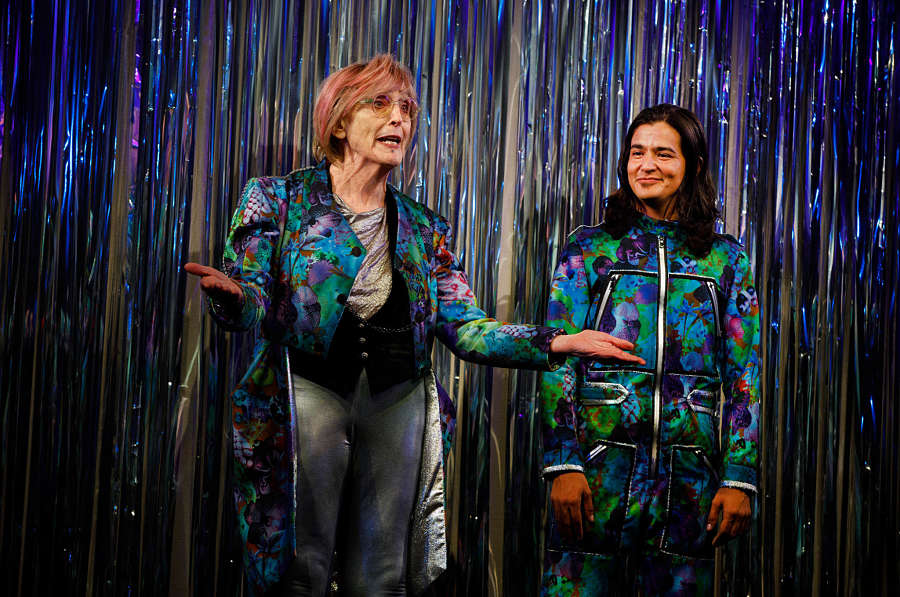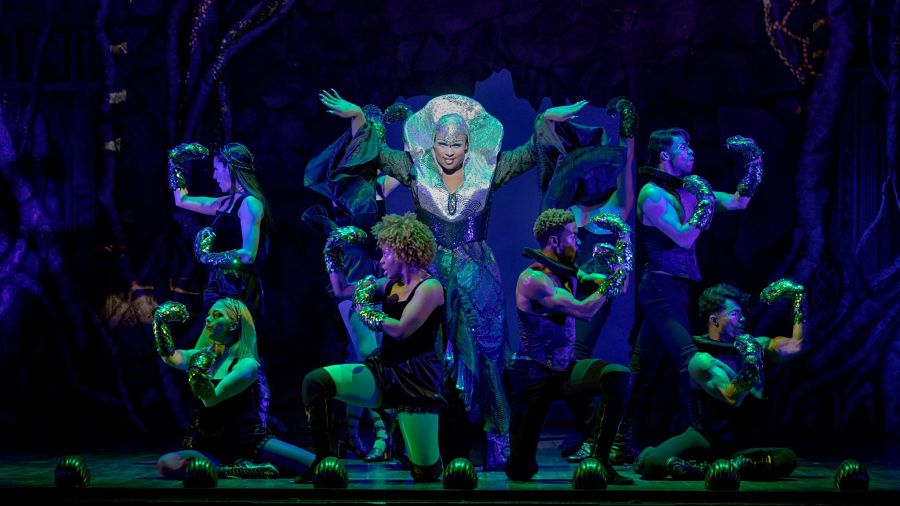In the past several months, Broadway has seen an influx of shows featuring queer, trans, and gender-nonconforming characters and actors, including Head Over Heels andStraight White Men. While this rush of new representation is heartening and has largely been praised both by members of the queer community and theatregoers, there has been a steep learning curve on the part of theatre critics regarding how to talk about queer folks in the context of these roles.
Of course, it’s to be expected that writing about a community one is unfamiliar with can lead to some stumbling blocks. But our patience was tested in July, when Ben Brantley’s review of Head Over Heels in The New York Times featured a misgendering of a nonbinary character. First he wearily called the term “binary” an “overused word.” Then, in reference to the character Pythio (played by Peppermint, who is transgender), he wrote:
Pythio identifies as “nonbinary plural.” Dametas (Tom Alan Robbins), the King’s viceroy and father of Mopsa, finds himself strangely drawn to her–I mean them.
Following a backlash on social media, Brantley subsequently issued an apology and the offensive lines have since been stricken from the review.
As queer writers with varying gender and sexual identities, we felt it important to respond to this controversy in a productive way. We’d like to take this opportunity to share some tips with critics who may be less familiar with the queer community and how we would like to be talked about. We hope this quick guide can prevent some missteps in the future (especially as the American theatre becomes more queer, not less).
1) Don’t use slurs. Don’t mock identities, pronouns, transitions, coming-out stories, or identity explorations. This should go without saying, but it can’t be overstated: Don’t use a review to mock any aspect of the queer or transgender experience. It’s inappropriate to use slurs to refer to valid identities, whether or not they are used in the play you are reviewing. Theatre will always deal with difficult subject matter, and reviews are a great way for audiences to know what they’re getting into, but they should not be a place to be re-exposed to traumatic words.
2) Ask if you’re unsure. The easiest way to avoid misrepresenting a queer person is to use the words they use for themselves. (The exception to this rule hearkens back to rule No. 1: If a queer person uses a slur to describe themselves, that’s their prerogative—but if you’re not a member of the queer community, it’s never your word to use, unless you clearly state that this is the word the person wants to be known as.)
If you’re unsure what words to use to describe a character, go back to the script and note how the character describes themselves or how other characters refer to them. The same is true for talking about actors: If you’re unsure how they identify, ask the press representative for the show, or simply reach out to the performer directly. It’s not offensive to ask. No one is expected to know another person’s identity.
Normalizing asking for a person’s pronouns and how they’d like to be talked about is key to making sure everyone feels well-represented. At the start of any interview, give your subject space to describe themselves, how they identify, their pronouns, and terms they use to describe their bodies, their race, their gender, and their sexuality.
Also, don’t simply assume identities from the content of the play nor from a character’s or actor’s appearance. And keep in mind that an actor might use different pronouns from an onstage character. For example, Peppermint uses she/her pronouns, while her character in Head Over Heels uses they/them, so critics—with varying degrees of success—had to be careful when referring to the actor versus the character.
3) Just as language is fluid, sexuality and gender identity can be fluid as well. Someone who may have identified as bisexual may later consider themselves pansexual or gay, or may choose to eschew those words entirely. Do your best to keep up with the evolution of language as well as the evolution of people’s identities. And always double-check the meaning of a word if you’re unsure of how to use it contextually.
In other words, never assume that someone’s identity is static. If you’re interviewing someone you’ve talked to before, check in to see if they still identify themselves in the same way.
4) When talking about trans-ness, be respectful and knowledgeable. It is offensive to describe someone as “born as male” or “born as female,” or to use their assigned-at-birth gender and name. This practice is called “deadnaming.” Phrases like “he becomes she” are out of date and disrespectful. You can refer to the actor or character before their transition, but “pre-transition” should be used.
What if a trans actor is playing a character that isn’t trans; should that be pointed out? In this case the only reason to remark on an actor’s trans-ness is to praise the hiring of a trans actor, still a rarity in entertainment. Overall it’s rarely, if ever, necessary to comment on the body of an actor, trans or not. If you do feel the need to do so, make sure it’s done in a positive way.

We’ve spoken a great deal about acknowledging a person’s chosen identity and respecting the language they use to describe themselves. And it really is as simple as that. These same guidelines are helpful when talking about any marginalized community. The queer community is not a monolith, nor are communities of people of color or people with disabilities. Each community and even subsets within that community may have their own vocabulary for various identities. Always make sure to ask how someone describes their identity and their body before writing about them.
So you’ve done your due diligence. You’ve thoroughly researched the community you’re writing about, you’ve consulted artists about how they’d like to be represented, and you’re confident in the piece you’re submitting. There are a few additional things to keep in mind.
If you’re using nonbinary pronouns, be aware that publications may attempt to edit them out. They may simply think it’s a mistake they’re trying to misguidedly correct or they may use their style guide as an excuse (e.g. “The singular ‘they’ is grammatically incorrect”). To combat this you should make them aware of pronoun usage during the submission process, e.g., “[Artist] uses they/them pronouns. It is not an error. It is a critical acknowledgment of their gender identity. Please do not change or remove these pronouns.” Or refer them to the AP Style Guide, which recently adopted “they” as a singular, gender-nonconforming pronoun.
If an outlet does edit something vital and it makes it to publication, bring it to the editor’s attention immediately. If they’re unwilling or unable to correct it, consider providing an unedited version of the piece on your personal website with a disclaimer explaining the situation.
What happens if you make a mistake? The answer is simple: Learn from it. Accept corrections, admit fault, and move on. If you are called out, own up to your error. Recognize your own ignorance and promise to get educated and try harder in the future. You may not be forgiven, but take being corrected as an educational opportunity, and inform your readers that you are striving to improve.
Jen Gushue (she/her) is a freelance theatre writer with bylines in American Theatre, HowlRound, TDF Stages, The Brooklyn Rail, and Business Insider. She is also an arts marketer and occasional production manager.
Caroline Cao (she/her) is a freelance theatre and movie writer with bylines on American Theatre, IndieWire, The Mary Sue, and Birth Movies Death. She is a Class of 2019 nonfiction MFA student at The New School and balances out her memoir writing with playwriting.
Christian Lewis (they/them) is a theatre critic and freelance theatre writer with bylines in The Huffington Post, Medium, and Broadway World. They are also a graduate student pursuing a PhD in English at the CUNY Graduate Center; they have a B.A. in English and Drama from Vassar College.
Sloth Levine (they/them) is a director, playwright, designer, and advocate for transgender and non-binary theatre makers based in Boston. They have a B.A. in Theatre Studies from Emerson College.


